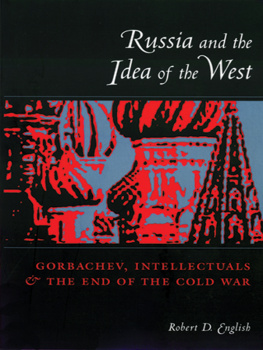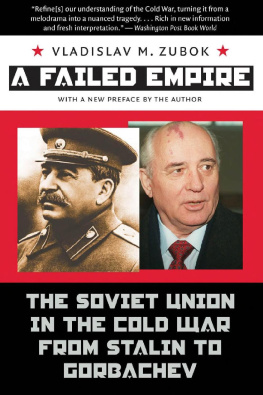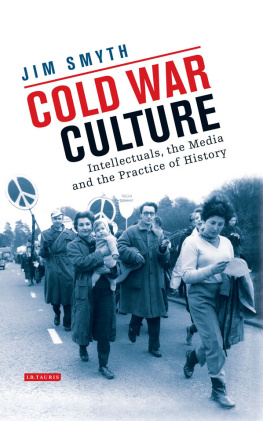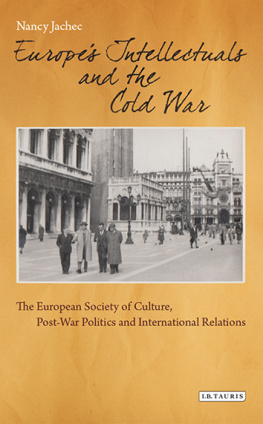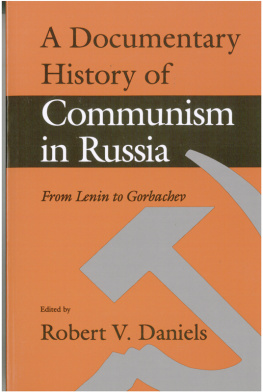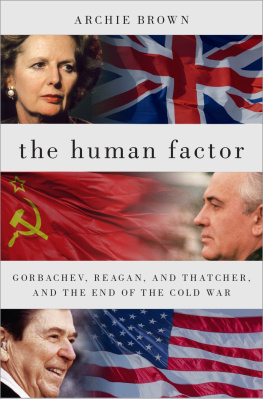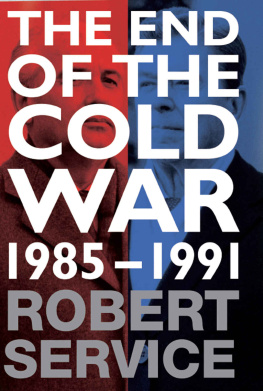English Robert - Gorbachev, Intellectuals, and the End of the Cold War
Here you can read online English Robert - Gorbachev, Intellectuals, and the End of the Cold War full text of the book (entire story) in english for free. Download pdf and epub, get meaning, cover and reviews about this ebook. year: 2000, publisher: Columbia University Press, genre: Politics. Description of the work, (preface) as well as reviews are available. Best literature library LitArk.com created for fans of good reading and offers a wide selection of genres:
Romance novel
Science fiction
Adventure
Detective
Science
History
Home and family
Prose
Art
Politics
Computer
Non-fiction
Religion
Business
Children
Humor
Choose a favorite category and find really read worthwhile books. Enjoy immersion in the world of imagination, feel the emotions of the characters or learn something new for yourself, make an fascinating discovery.
- Book:Gorbachev, Intellectuals, and the End of the Cold War
- Author:
- Publisher:Columbia University Press
- Genre:
- Year:2000
- Rating:5 / 5
- Favourites:Add to favourites
- Your mark:
- 100
- 1
- 2
- 3
- 4
- 5
Gorbachev, Intellectuals, and the End of the Cold War: summary, description and annotation
We offer to read an annotation, description, summary or preface (depends on what the author of the book "Gorbachev, Intellectuals, and the End of the Cold War" wrote himself). If you haven't found the necessary information about the book — write in the comments, we will try to find it.
Gorbachev, Intellectuals, and the End of the Cold War — read online for free the complete book (whole text) full work
Below is the text of the book, divided by pages. System saving the place of the last page read, allows you to conveniently read the book "Gorbachev, Intellectuals, and the End of the Cold War" online for free, without having to search again every time where you left off. Put a bookmark, and you can go to the page where you finished reading at any time.
Font size:
Interval:
Bookmark:

Russia and the Idea of the West
Russia and the Idea of the West
GORBACHEV, INTELLECTUALS, AND THE END OF THE COLD WAR
Robert D. English

Columbia University Press NEW YORK
Columbia University Press
Publishers Since 1893
New York Chichester, West Sussex
cup.columbia.edu
Copyright 2000 Columbia University Press
All rights reserved
E-ISBN 978-0-231-50474-4
Library of Congress Cataloging-in-Publication Data
English, Robert (Robert D.)
Russia and the idea of the West : Gorbachev, intellectuals, and the end of the Cold War Robert English.
p.cm.
Includes bibliographical references and index.
ISBN 0-231-11058-8 (cl)ISBN 0-231-11059-6 (pa)
1. Soviet UnionPolitics and government19531985Philosophy. 2. Soviet UnionPolitics and government19851991Philosophy. 3. IntellectualsSoviet UnionPolitical activity. 4. Soviet UnionrelationsUnited States. 5. United StatesRelationsSoviet Union. 6. Soviet UnionRelationsEurope, Western. 7. Europe, WesternRelationsSoviet Union. I. Title.
DK274.E54 2000
303.4824701821dc21
00-024327
A Columbia University Press E-book.
CUP would be pleased to hear about your reading experience with this e-book at .
Designed by Audrey Smith
For Magda, Dave, Zhenya, and Bob

Contents

This book was conceived in the heady early days of perestroika with the intention of exploring a seemingly simple question: What was the source of the so-called new thinking that, already in 198788, was radically transforming both the theory and practice of Soviet international relations? With an undergraduate education focused on Russian and especially East European history, followed by a masters degree in international affairs and six years subsequent work in defense and armscontrol analysis, I began the formal study of political science with an eclectic and admittedly unsystematic perspective on Soviet politics. And it was a perspective that two years of training in preparation for thesis research did little to systematize. For Princeton, in its wisdom, allowed me to divide my coursework among the Departments of Politics, History, and the Woodrow Wilson School. Encouraged simultaneously to explore the nature of the international and domestic systems, to appreciate both the influence of culture and the innovation of leadership, and to understand the complex sources of previous reform epochs in Russian and Soviet politics, I was ultimately on my own in searching for the nexus of power and ideology in perestroika.
This benign neglect was something I initially regretted as my Moscow fieldwork began in earnest in mid-1989. I envied my exchange colleagues their fine-tuned theories and specific research assignments, which contrasted sharply with my admittedly vague focus on within-system reformers and my research missionthen little better defined than to talk to as many people as possible, and read as much as I could, about foreign affairs. But this regret soon turned to appreciation because, with so much in flux (from policy itself to the people and ideas behind it, and the opportunities to explore both) a looser orienting framework allowed me continually to learn, adapt, and innovate.
These conditions, with the added circumstance of my wifes work as a correspondent for Time, then Newsweek and the Wall Street Journal, were invaluable, in both enriching and prolonging my stay in Moscow (through late-1991). This gave me the time to work in the archives of the USSR Foreign Ministry and the closed, spetskhran collections of several foreign-policy institutes. It enabled me to travel widely, in both provincial Russia and such regional centers of early reformist thought as Tallinn and Tbilisi (and to view the collapse of empire from the periphery as well as the metropole). Most of all, it allowed me the opportunity to conduct nearly 400 interviews with more than 100 different individuals. They ranged from Brezhnev-era Politburo members Petr Shelest and Gennady Voronov to such perestroika-era notables as Mikhail Gorbachev, Eduard Shevardnadze, Alexander Yakovlev, Yegor Ligachev, and Sergei Akhromeyev. But even more important were meetings with dozens of lesser-known apparatchiks and academicsforeign-affairs analysts, economists, historians, philosophers, scientists, artists, writers, and diplomats. These interviewsand the unpublished studies and memoranda to which they led, together with numerous classified reports, published articles, and memoirswould constitute the core of my research.
Time and again, long afternoons or evenings spent reliving little-known events of the 1950s or reconstructing closed-door debates of the 1960s and 1970s uncovered the myriad episodes and experiences that contributed to the emergence of new thinking. Scientists recalled their earliest concerns about the environment; economists described their first exposure to Yugoslav self-management or their first reading of Paul Samuelson; historians recounted their thaw-era research in Poland and Italy; philosophers and sociologists led me to samizdat lectures and the works of obscure scholars in institutes far beyond Moscow. Some policy analysts, diplomats, and even military officers eventually opened their personal archives to me. Others opened the door to an ever-widening circle of interlocutors, and thus to an ever-growing appreciation of the social as well as intellectual dimensions of the new thinkers as a diverse but unified community of Westernizing reformers.
Little of this would have emerged had I begun with a narrowly structured model and rigid research plan. Even less would it have been possible had I followed the advice of one senior Sovietologist who, in a predeparture briefing, urged me to conduct my interviews via a standardized questionnaire. What little that would have gained me in quantifiability would have cost much in qualitative terms. Only a free-flowing and wide-ranging approach, going deeply into the particular experiences of each individual while building on the insights gleaned from others, could have yielded so much. For not until months into the processonly when I had acquired a large evidentiary base and thus begun to see the contours of a little-known intellectual historydid I even know which questions to ask.
Throughout, there was a growing sense of urgency as a shifting political climate affected the accessibility or volubility of some interlocutors, while mortality began to take its toll on others. Many were the Children of the 20th Party Congress, that landmark event in post-Stalin liberalization, who by the late 1980s were well into their sixties. Others survive, and I was able to supplement my original researchand better place it in political-historical contextwith extended return visits to the new Russia during the parliamentary elections of December 1993 and the presidential contest of June/July 1996. Readers of the chapters that follow will judge for themselves the extent to which I have found that proper context.
For this preface, there remains only to acknowledge the many institutions and individuals who made this project possible. The International Research and Exchanges Board supported my first, critical academic year in Moscow; the USSR Academy of Sciences extended my research privileges for two more; and the Princeton Society of Fellows and Center of International Studies supported the writing of a dissertation. Allegheny College funded subsequent research in Moscow that was vital in revising this book in manuscript.
Next pageFont size:
Interval:
Bookmark:
Similar books «Gorbachev, Intellectuals, and the End of the Cold War»
Look at similar books to Gorbachev, Intellectuals, and the End of the Cold War. We have selected literature similar in name and meaning in the hope of providing readers with more options to find new, interesting, not yet read works.
Discussion, reviews of the book Gorbachev, Intellectuals, and the End of the Cold War and just readers' own opinions. Leave your comments, write what you think about the work, its meaning or the main characters. Specify what exactly you liked and what you didn't like, and why you think so.

